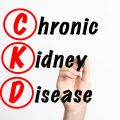Kidney Disease And A Low Sodium Diet
Your kidneys are in your lower back and are, you guessed it, shaped like kidney beans. These two organs may be more important to your health and wellbeing than you realize. They are part of the body's filtration system, removing waste and excess fluid, purifying blood, and producing urine. They also produce hormones that regulate activities in the body like blood pressure, creation of red blood cells, and calcium absorption.
Chronic Kidney Disease, or CKD, is the 8th leading cause of death in the United States with over 20 million sufferers. Many don't even know that they have it until the beginning stages of kidney failure. The two leading causes of kidney disease are diabetes and high blood pressure, which are among the most common illnesses today. The good news is that you can take steps to control all three conditions by getting proper exercise, not smoking, and eating a healthy low sodium diet.
When a kidney becomes diseased, it can no longer properly remove waste or balance the fluids in your body. This affects your body chemistry in many ways. Some of the resulting symptoms are noticeable, but others will only show up in medical tests. Common problems that may be signs of a diseased kidney are high blood pressure, anemia, and weakening of the bones.
The first steps to controlling CKD are to control the contributing factors of diabetes and high blood pressure. And controlling these conditions involves lifestyle changes such as quitting smoking, getting to and maintaining a healthy weight, proper exercise, and reducing your intake of harmful substances such as alcohol and salt.
The conditions of diabetes, high blood pressure, and CKD intensifies the severity of each other, and if a person has a combination of these it must be taken into account in their medical treatment. For example, the National Kidney Foundation recommends keeping your blood pressure at or below 130/85. However, if you have diabetes, they recommend 125/75. CKD also affects prescription of insulin and blood pressure medicines. Proper maintenance of blood pressure and blood glucose levels will help slow the progression of CKD.
While medical treatments are important, a healthy low sodium diet is just as crucial. On average, a kidney patient should limit their sodium intake from 1,000 to 2,000mg per day. Your doctor will give you specific advice based on your unique situation. Obviously fast food, canned foods, processed meats, and salty snacks will have to go, but there are many not so obvious sources of sodium. The things we use to add flavor to our meals, such as salad dressings, sauces, and seasonings, often have a lot of salt. The average ketchup contains 3.4 grams of sugar and 167mg of sodium in every tablespoon. Italian dressing, one of the healthier salad dressings, has 243mg of sodium per tablespoon. And most of us use more than 1 tablespoon at a time.
You may be thinking that having to eat bland, tasteless foods is just too much on top of your medical treatments. But don't despair yet. You can make your own salad dressings and sauces using salt-free seasonings and salt alternatives such as salt substitutes (usually without potassium chloride), fresh lemon juice, freshly ground black pepper, fresh herbs, garlic, vinegars just to name a few ingredients to add flavor instead of salt. There are many sources of low sodium recipes available in cookbooks and on the internet.
Over a quarter of the population 60 and older are living with kidney disease, and the important word here is living. With proper medical treatment and a healthy lifestyle including a low sodium diet, a person with CKD can still lead a full life.







